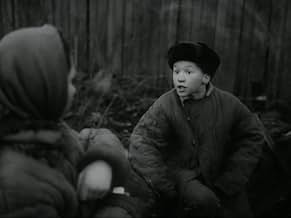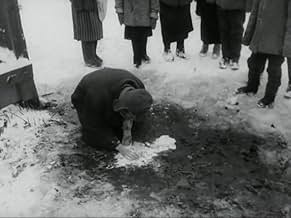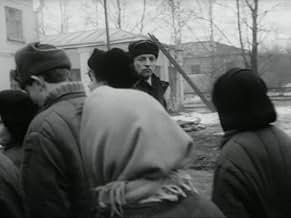IMDb RATING
7.5/10
992
YOUR RATING
Two children living in a remote mining town in the distant wastes of Siberia in 1947, survive poverty and hardship through the warmth of their friendship and a shared sense of humour.Two children living in a remote mining town in the distant wastes of Siberia in 1947, survive poverty and hardship through the warmth of their friendship and a shared sense of humour.Two children living in a remote mining town in the distant wastes of Siberia in 1947, survive poverty and hardship through the warmth of their friendship and a shared sense of humour.
- Awards
- 7 wins & 6 nominations total
- Director
- Writer
- All cast & crew
- Production, box office & more at IMDbPro
Featured reviews
The unusual title (never explained) is supposedly the name of a popular Russian children's game, but the only contest being waged in this remote town on the far eastern edge of Soviet Asia is called survival, and it's clear there aren't too many winners. One of the more exciting Soviet imports in quite a while is also one of the more depressing films ever made, presenting a tough and totally unsentimental depiction of childhood as seen through the eyes of a rebellious schoolboy and the level-headed young girl with whom he develops an antagonistic friendship. There's a strong documentary flavor to the episodic storyline and grainy black and white photography, and writer director Vitaly Kanevsky devotes equal time to the conditions which shape their fate (note the subtle but unmistakable condemnation of Stalinism recurring throughout). In effect the film is more of a mood piece, with the environment itself (ice, mud and manure) becoming the primary character. It's not always an easy film to watch or understand, but the effort can make it a rewarding experience.
10Céline
"Zamri, umri, vokresni!" is not, at first sight, a positive movie. And, as it develops, the tone gets darker. Vitali Kanevsky, the director, makes a very good use of black-and-white film. The lives of Galia and Valerka get increasingly unbearable. They make it bearable, however, by making easy bantering between them about which one's tea is better as they sell them to the people. Little things like that. In all the misery that he lives in, Valerka's main goal is still to catch a robber who stole his skates. They have not lost their childhood, not yet. Not until the end. It is interesting to note that "Zamri, umri, vokresni!" is also the name of a children's game in Russia. It means, literally, "Freeze, Die, Rise!"
Very interesting look into stark Soviet history, in the time of Gulags and "work settlements," as told through the eyes of children who live there.
In between the squalid conditions, flowers of humanity sprout out, in the form of friendship and ill-appreciated loyalties. This is a tale of understanding what life may or must have been like in such settlements. It strikes a chord with those who can or try to understand such environments. The analogies are quite interesting, as they are critical. (Take the scene for instance, of the parade through the sewage around the school, while hoisting Stalin's portrait on high.)
While not as other Russian imports (VOR/THE THIEF, BURNT BY THE SUN or the French-Russian film, THE EAST), ZAMRI, UMRI, VOSKRESNI! has a message and a decent story to tell.
Recommended.
In between the squalid conditions, flowers of humanity sprout out, in the form of friendship and ill-appreciated loyalties. This is a tale of understanding what life may or must have been like in such settlements. It strikes a chord with those who can or try to understand such environments. The analogies are quite interesting, as they are critical. (Take the scene for instance, of the parade through the sewage around the school, while hoisting Stalin's portrait on high.)
While not as other Russian imports (VOR/THE THIEF, BURNT BY THE SUN or the French-Russian film, THE EAST), ZAMRI, UMRI, VOSKRESNI! has a message and a decent story to tell.
Recommended.
I have seen "Don't Move, Die and Rise Again" described as one of the grimmest studies of childhood on film. Superficially, yes, but the young hero, Valerka, has a resilience that allows him to cope with most of the situations in which he finds himself. Children in Dickens or the Brontes often suffer far more. But, having said that, the setting of the first three-quarters of the film is almost unbelievably drab and depressing. We are in a mining community situated not far from Vladivostok during the season where snow is melting into slush and mud; the time, shortly after the end of World War II. Valerka, who lives with his unmarried mother, is an extremely streetwise early teenager. He makes what little money he can by brewing cups of tea for miners coming off their shifts and vies with Galia, another girl tea vendor in claims for making it from the freshest water. Their rivalry turns into a camaraderie which is developed and sustained throughout a film that is otherwise rather short on character interest. For the rest, it is the spirit of place that predominates, with a stark naturalism that reminds me at times of the "Bill Douglas Trilogy" with its equally uncompromising depiction of an unlovely semi-industrial wasteland. Only in the last half-hour is there much action. After being responsible for a minor train derailment, Valerka flees his home only to get involved with a gang of thieves. The ending is tragic but at the same time rather inconclusive. By having a discursive opening and middle and an action packed conclusion, the film suffers from erratic pacing. I also found it much less involving and consequently less moving that its material would suggest. Just another piece of Russian misery, then? Not quite. It contains several uneasy images that one recalls long after it is over, several of amputees and an extraordinary closeup of a passer by in a quiet street, smiling to reveal rows of grotesque metallic crowns. Above all "Don't Move, Die and Rise Again" has the virtue of memorability.
I don't know why I've seen so many reflexive, "only a movie" films lately, but here's another. It makes you wonder whether a viewer can choose to alter a film in his own mind, and take out the bits -- like this, for instance -- that partly ruin or deplete the experience for you. Aside from that, the film, which has rightly been assessed as being a kind of Russian "400 Blows," is awfully good, but since nothing really happens you may find yourself wishing it were shorter; but for me, it's enough to just enjoy the beautiful black and white cinematography, and the performance of this boy. It's a remarkable performance -- he's loud but not obnoxious, a little whiny but not snotty, cute but not sickly sweet. Even though the look and the feel of the film is unique -- or, a unique amalgam, I'll say -- even had it not been, it could rest quite well on the face of this boy, which is open, feminine, and almost Asian in its features, with sharp, tiny black eyes.
There are some pretty raucous scenes -- the most effective being a scene where villagers are clamoring for food handouts and one man eats a "pancake" of flour and mud, but also one at a cultural event (a ball of some sort?) where the visitors turn to drink. And like that other children's classic, "My Life as a Dog," it has one scene that will stay with you a while -- that one had the bottle scene, and this one has a scene where our hero gets peed on. (Unlike that film, not much attention is paid to sex; although there is one act of desperate adolescent sexual desire -- although it's more like a begging -- that's pretty good.)
The oblique narrative is sometimes hard to understand -- at least to me -- not tonally (it's neither light nor harsh, but it has a specific feel) but literally, and that's probably aided by the fact that the film is mostly a series of events rather than a kind of plot. That's fine, because many of the individual scenes are thoroughly interesting, and every once in a while we get one like the ice skate thieving, which is disorienting and lyrical at the same time. What's particularly interesting about the film, I think, is that it goes beyond mere mischievousness -- like James Dean, we are presented with a kid who wants to do the right thing, but everything he does gets screwed up. And it's surprising that we end up on his side, considering the fact that he at one point tips over a train. 9/10
There are some pretty raucous scenes -- the most effective being a scene where villagers are clamoring for food handouts and one man eats a "pancake" of flour and mud, but also one at a cultural event (a ball of some sort?) where the visitors turn to drink. And like that other children's classic, "My Life as a Dog," it has one scene that will stay with you a while -- that one had the bottle scene, and this one has a scene where our hero gets peed on. (Unlike that film, not much attention is paid to sex; although there is one act of desperate adolescent sexual desire -- although it's more like a begging -- that's pretty good.)
The oblique narrative is sometimes hard to understand -- at least to me -- not tonally (it's neither light nor harsh, but it has a specific feel) but literally, and that's probably aided by the fact that the film is mostly a series of events rather than a kind of plot. That's fine, because many of the individual scenes are thoroughly interesting, and every once in a while we get one like the ice skate thieving, which is disorienting and lyrical at the same time. What's particularly interesting about the film, I think, is that it goes beyond mere mischievousness -- like James Dean, we are presented with a kid who wants to do the right thing, but everything he does gets screwed up. And it's surprising that we end up on his side, considering the fact that he at one point tips over a train. 9/10
Did you know
- ConnectionsEdited into Histoire(s) du cinéma: Une vague nouvelle (1999)
- SoundtracksYosakoi-bushi
(Kôchi prefecture folk song)
Details
- Release date
- Country of origin
- Languages
- Also known as
- Freeze Die Come to Life
- Filming locations
- Partizansk, Russia(mining town formerly known as Suchan)
- Production companies
- See more company credits at IMDbPro
- Runtime
- 1h 45m(105 min)
- Color
- Sound mix
Contribute to this page
Suggest an edit or add missing content

























